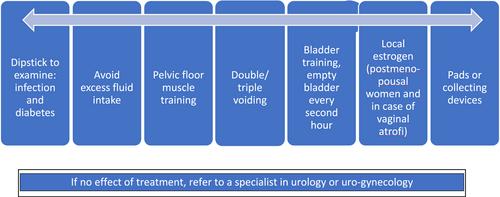Practical management algorithms for late complications after colorectal and anal cancer—Basic treatment of late complications
Abstract
Background
The aim of this work was to develop a basic treatment guideline set for late complications after treatment for colorectal and anal cancer. Furthermore, a prerequisite was that the guideline was appropriate and safe to use for all health care staff regardless of their educational level. Lastly, the set should cover the most common late complications for patients treated for colorectal and anal cancer, including stool, urinary, sexual, and depressive symptoms.
Methods
The treatment algorithms were developed by doctors in the Late Complication Clinic and afterward they were discussed to establish consensus with external experts in different fields such as surgery, gastroenterology, dietitian, gynecology, urology, sexology, general practice, anesthesiology, and psychiatry.
Results
We have developed a practical basic guideline set covering the most common late complications after colorectal and anal cancer treatment. The guideline set can be used by both nurses and doctors. The treatment algorithms are a combination of ordinary treatment principles and the best possible evidence in the field of late complications after colorectal and anal cancer.
Conclusions
We have developed a basic treatment guideline set for late complications after treatment for colorectal and anal cancers. There is generally little evidence in the field of late complications, and the evidence is mostly based on consensus. To establish higher-level evidence for late complication treatment after colorectal and anal cancer, it is important to monitor and adjust the treatment algorithms.


 求助内容:
求助内容: 应助结果提醒方式:
应助结果提醒方式:


